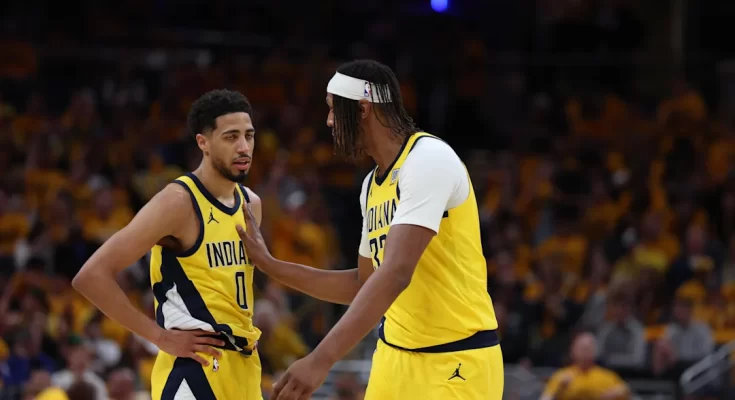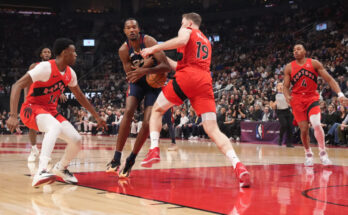Tyrese Haliburton, the young and talented guard for the Indiana Pacers, has been making waves in the NBA with his smooth playmaking ability, sharp shooting, and high basketball IQ. Since entering the league, Haliburton has quickly become one of the faces of the Pacers’ future, a player capable of not only filling the stat sheet but also elevating the overall team dynamics. However, amidst his rise and the team’s ongoing quest to climb the Eastern Conference ladder, there has been one move that Haliburton openly admitted he wishes had gone differently — the decision of his former teammate Myles Turner to join the Milwaukee Bucks.
Turner, a dominant rim protector and a versatile big man, was a crucial part of the Pacers’ core for years. He was a consistent defensive anchor, a reliable scorer in the post and midrange, and an important contributor to Indiana’s identity as a team capable of competing in a tough conference. His departure to the Bucks, one of the top contenders in the East, was understandably a significant blow to the Pacers, who were looking to build around Haliburton and carve out a competitive niche for themselves. In a candid interview, Haliburton acknowledged that seeing Turner join a rival team — especially one as strong and well-positioned as Milwaukee — was a tough pill to swallow. He admitted that he wished Turner had stayed in Indiana rather than moving across the conference.
This admission sheds light on several layers of the NBA’s competitive landscape and the personal and professional relationships that players navigate during free agency and trades. On one level, it’s a straightforward expression of a player’s wish to keep a valuable teammate within the fold, someone who complements their style and shares their ambitions. But on a broader scale, it also underscores the challenge smaller-market teams like the Pacers face in retaining star talent amid competition from bigger-market, more championship-ready franchises.
Tyrese Haliburton’s journey in the NBA has been marked by steady development and the promise of a bright future. Drafted 12th overall in 2020 by the Sacramento Kings and then traded to the Pacers, Haliburton quickly became a foundational piece for Indiana. His ability to run an offense, create shots for teammates, and maintain a high level of efficiency made him an indispensable part of the team’s plans. Meanwhile, Myles Turner, drafted seventh overall in 2015, had established himself as one of the best defensive big men in the league. His shot-blocking prowess, ability to stretch the floor with three-point shooting, and rebounding made him a rare talent that teams covet.
The synergy between Haliburton and Turner was evident whenever they were on the court together. Turner’s presence in the paint allowed Haliburton to play with confidence, knowing he had a reliable defender behind him. At the same time, Haliburton’s playmaking skills opened up opportunities for Turner on offense. The pairing symbolized a balanced team that could potentially grow into a contender with the right pieces around them. Yet, as Turner’s contract situation unfolded and the Bucks emerged as a suitor, the dynamic shifted dramatically.
The Bucks, led by two-time MVP Giannis Antetokounmpo, are among the elite teams in the NBA with a strong chance to compete for championships each year. Adding a player like Myles Turner, who fits seamlessly into their defensive schemes and complements their offensive firepower, was a strategic move to bolster their roster depth and versatility. From Turner’s perspective, joining a team with established championship aspirations likely presented an opportunity to compete at the highest level and maximize his career trajectory.
For the Pacers and Haliburton, however, the loss of Turner was more than just a roster change — it was a setback in their long-term vision. Haliburton’s admission that he wished Turner hadn’t joined the Bucks reveals a layer of disappointment and perhaps a recognition of the uphill battle the Pacers now face. It reflects a desire to keep building around a nucleus of players with proven chemistry rather than having to restart or retool without one of their most important pieces.
Moreover, Haliburton’s statement is a reminder of the human side of professional sports. Beyond contracts, trades, and strategic moves, there are friendships and bonds formed on and off the court. Players develop mutual respect and trust through countless hours of practice, games, and shared experiences. Losing a teammate isn’t just a strategic loss; it can feel personal. Haliburton’s candid reflection hints at the complexity of player decisions, where professional growth and team loyalty sometimes collide.
The Pacers, historically a franchise with a strong fan base but limited recent postseason success, have been striving to break through and become a consistent playoff presence. The emergence of Tyrese Haliburton as a franchise cornerstone was a critical step in that direction. Keeping complementary players like Turner was essential to creating a balanced team that could challenge the powerhouses in the East. Now, without Turner, the Pacers face the task of finding new ways to build around Haliburton’s unique talents.
From a tactical perspective, the Pacers will need to recalibrate their defensive and offensive strategies. Turner’s shot-blocking and ability to guard multiple positions allowed Indiana to be more aggressive and versatile on defense. His shooting range stretched opposing defenses, giving more space for Haliburton and others to operate. Without that, Indiana’s coaching staff must find alternatives that maintain a similar level of defensive intensity and offensive fluidity.
For Haliburton, the change means increased responsibility. As the undisputed leader on the floor, he will need to continue growing as a scorer and facilitator while adapting to new teammates and systems. His ability to stay calm under pressure, read defenses, and create opportunities will be paramount as the Pacers try to stay competitive in a deep conference. His leadership and attitude will set the tone for the team’s resilience amid roster changes.
On the other side, the Bucks’ acquisition of Turner strengthens their championship window. With Giannis leading the charge, supported by shooters and role players, Turner’s defensive presence helps solidify their interior defense, making it tougher for opponents to score in the paint. His ability to space the floor and protect the rim gives Milwaukee more flexibility and matchup advantages. This move signals that the Bucks are serious about maintaining their status as title contenders in the coming seasons.
Haliburton’s honest admission also serves as a subtle challenge to the Pacers’ front office. Retaining key players and making smart acquisitions is critical in today’s NBA, where team chemistry and depth can be the difference between a first-round exit and a deep playoff run. The Pacers need to demonstrate that they can not only develop young talent but also surround those players with the right complementary pieces. This will require savvy drafting, intelligent trades, and perhaps attracting free agents who believe in the team’s vision.
For fans, Haliburton’s comments humanize the sport. It’s a reminder that players are not just athletes but individuals who form meaningful relationships and feel the impact of team changes deeply. It also highlights the challenge smaller-market teams face in retaining stars and building sustainable success amid the allure of larger markets and more immediate championship prospects.
Looking ahead, Haliburton’s admission might spark conversations within the Pacers organization about their direction and the urgency to build a roster that can maximize his talents. It underscores the need for strategic planning and perhaps a more aggressive approach in free agency or trades to avoid losing more key players to rival teams. It also places a spotlight on the emotional and motivational factors that drive players to either stay loyal or seek new opportunities.
In sum, Tyrese Haliburton’s admission that he wished Myles Turner hadn’t joined the Milwaukee Bucks is a candid reflection of the complexities of modern NBA team-building, the personal bonds players share, and the competitive realities faced by franchises like the Pacers. It captures a moment of vulnerability and realism, revealing how intertwined the personal and professional aspects of basketball truly are. For Haliburton, the challenge now is to harness that disappointment and channel it into leadership and performance that can inspire Indiana to overcome setbacks and strive for greater success.
As the NBA landscape continues to evolve, the stories behind these player moves will remain integral to understanding the game beyond the box scores. Haliburton’s words remind us that every roster change carries a ripple effect — affecting not only team strategy and performance but also the human connections that make basketball more than just a sport. It will be fascinating to watch how Haliburton and the Pacers respond to this challenge and whether they can build a new, formidable identity that honors what Turner brought to the team while carving out a fresh path forward.



